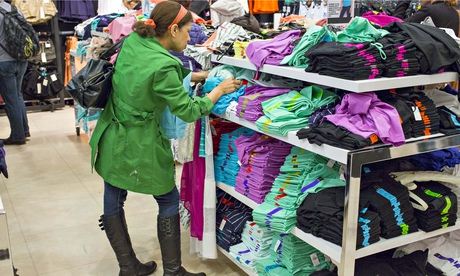Franchising, retail, business

17/06/2014
Rate of annual inflation below Bank of England's target, helped by falls in air fares, food, and clothes, but rise in cost of living still above average pay
Inflation fell to its lowest level in almost five years in May as supermarket discount wars and a sharp fall in air fares benefited shoppers and travellers.
The annual increase in the cost of living, as measured by the consumer prices index, fell more than expected to 1.5% from 1.8% in April following the first annual decline in food and non-alcoholic drinks prices in more than eight years. Food prices fell 0.6% in the year to May as Britain's major supermarkets battled for customers, with the fall this May even steeper at 1.1%. Air fares fell by 6% in the year to May, and declined by 3.2% in May alone, after a big jump in April when people took trips over the Easter period.
The last time the rate of inflation was as low as 1.5% was October 2009, according to the Office for National Statistics. Responding to the May inflation data on Twitter, George Osborne said: "Good news that inflation is down to 1.5%, the lowest for five years. Another sign that our long-term economic plan is working, but lots more to do."
Despite the fall in May, inflation is still keeping up pressure on household finances by outpacing wage growth. Pay including bonuses rose by 0.7% between February and April according to the ONS, compared with that period a year earlier.
Economists said that the fall in inflation gave Bank of England policymakers flexibility over the timing of the first rise in interest rates, which have been held at 0.5% since March 2009. The City had predicted a smaller fall in the annual rate, to 1.7%.
At the Bank's last quarterly inflation report in May, governor Mark Carney said the first rise was most likely in the second quarter of 2015. However, last week he said that a rise could happen "sooner than markets currently expect", prompting renewed speculation that the first rise could come before the end of 2014.
Frances O'Grady, general secretary of the Trades Union Congress, said families in Britain were still suffering from squeezed living standards and urged against a rise in interest rates in 2014.
She said: "Inflation may have fallen slightly but prices continue to rise faster than wages. Living standards are still on the slide, which means that for many families the recovery is far from a reality.
"An interest rate rise this year would put many hard-pressed businesses and families under even greater financial strain. Today's figures show that there is no inflationary pressure to justify such a move."
The British Chambers of Commerce also argued the case for keeping rates on hold to reassure businesses and encourage investment. David Kern, the BCC's chief economist, said that while there might be a case for raising interest rates in early 2015, there should be no change for "the foreseeable future".
The pound weakened on the back of the figures. Sterling, which on Monday had pushed through the $1.70 mark to a five-year high against the dollar, slipped to $1.6940 from $1.6977 before the inflation data.
As well as falling food prices and air fares, lower clothing and footwear prices contributed to May's fall in inflation. In particular, women's coats were less expensive than a year earlier, as retailers raised prices last May during unseasonably cold weather. Within the food category, bread, cereal, meat, fruit and vegetable prices were all lower over the year.
Danny Alexander, chief secretary to the Treasury, claimed the lower inflation figure as a victory for the Liberal Democrats.
"As a result of our role in government, the Liberal Democrats have created the right climate for the recovery and the country is now getting back on the front foot. Today's inflation figures add to a developing pattern of low inflation, strengthening growth and high levels of job creation."
The annual rate of retail price inflation, traditionally used to calculate wage rises, fell to 2.4% in May from 2.5% in April.
Ian Stewart, chief economist at accounting firm Deloitte, said low inflation and strong growth in Britain was the "holy grail for economic policymakers".
"We are in the sweet spot of the economic cycle," he added.
By: theguardian.com